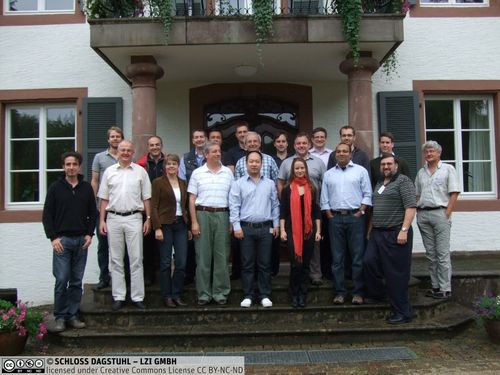Dagstuhl Perspectives Workshop 10301
Service Value Networks
( Jul 25 – Jul 30, 2010 )
Permalink
Organizers
- William E. Hefley (University of Pittsburgh, US)
- Steffen Lamparter (Siemens AG - München, DE)
- Christos Nikolaou (University of Crete - Heraklion, GR)
- Stefan Tai (KIT - Karlsruher Institut für Technologie, DE)
Contact
- Annette Beyer (for administrative matters)
Schedule
Services are receiving increasing attention in both the service economics and service computing communities. This trend is due to two observations:
- From an economics viewpoint, services today are contributing the majority of jobs, GDP, and productivity growth in Europe and in other countries worldwide. This includes all activities by service sector firms, services associated with physical goods production, as well as services of the public sector.
- From an ICT viewpoint, the evolution of the Web enables provisioning software-as-a-service (and, services-as-software). Modern software systems are designed as service-oriented architectures consisting of loosely coupled software components and data resources that are accessible as Web services.
The notion of ``service'' used in the corresponding research communities is different; however, they are not independent but have a strong symbiotic impact on each other. ICT services create and enable new ways of business process management and value co-creation for service providers and service consumers. They enable companies to spread their planning, design, manufacturing, distribution, and delivery functions. The modularization of corporate functions takes place in a wide range of industries (electronics, car manufacturing, aerospace, retail, etc.). Competitive markets evolve best of breed functions, which in turn encourage deconstruction of formerly vertically organized companies and industries into service systems, also referred as value networks, to capitalize on this advantage. One of the key aspects distinguishing service systems from the traditional product-centric view is the importance of value co-creation, i.e. customers act as co-producers in the service provisioning process or as co-innovators in the evolution of services. The concept of service value networks (SVNs) captures this idea by modeling the business structures and inter-relationships and dependencies between service providers, consumers, and intermediaries (or enablers). They facilitate representation of flexible, dynamic supply and demand chains together with their social, technological, and economic context. Thus, service value networks are a promising conceptual framework to better understand and manage the operational, strategic, and technological challenges of business design and business alliance formation.
The goal of the Dagstuhl Perspectives Seminar on Service Value Networks was to bring together researchers and experts from the various relevant fields and discuss the different existing approaches to modeling service value networks, identify shortcomings and open challenges, and to suggest a research agenda that leads to a better understanding of the functioning of complex service systems. This research agenda [1] identifies SVN research challenges. To address these challenges, the Manifesto provides a synthesis of outstanding research questions, with an emphasis on modeling and analysis of SVNs and the role of coordination in SVNs, and presents an outlook to future work to address these outstanding research questions and move the SVN field ahead.
- Hans Akkermans (Free University of Amsterdam, NL) [dblp]
- Kamal Bhattacharya (IBM Research - New Delhi, IN)
- Stephan Bloehdorn (KIT - Karlsruher Institut für Technologie, DE)
- Olha Danylevych (Universität Stuttgart, DE)
- Schahram Dustdar (TU Wien, AT) [dblp]
- Robin Fischer (KIT - Karlsruher Institut für Technologie, DE)
- William E. Hefley (University of Pittsburgh, US)
- Peep Küngas (University of Tartu, EE)
- Steffen Lamparter (Siemens AG - München, DE)
- Christine Legner (European Business School - Oestrich-Winkel, DE) [dblp]
- Jens Lemcke (SAP SE - Karlsruhe, DE)
- Christos Nikolaou (University of Crete - Heraklion, GR)
- Gerhard Satzger (KIT - Karlsruher Institut für Technologie, DE)
- Daniel Schall (TU Wien, AT)
- Ulrich Scholten (KIT - Karlsruher Institut für Technologie, DE)
- Sebastian Speiser (KIT - Karlsruher Institut für Technologie, DE)
- Rudi Studer (KIT - Karlsruher Institut für Technologie, DE) [dblp]
- Stefan Tai (KIT - Karlsruher Institut für Technologie, DE) [dblp]
- Willem-Jan van den Heuvel (Tilburg University, NL)
- Christof Weinhardt (KIT - Karlsruher Institut für Technologie, DE) [dblp]
- Christian Zirpins (KIT - Karlsruher Institut für Technologie, DE)
- Michael zur Muehlen (Stevens Institute of Technology - Hoboken, US) [dblp]
Classification
- Networks
- Complexity
- Optimization
- Software Engineering
Keywords
- Service Science
- Service Systems
- Value Networks
- Service-oriented Computing


